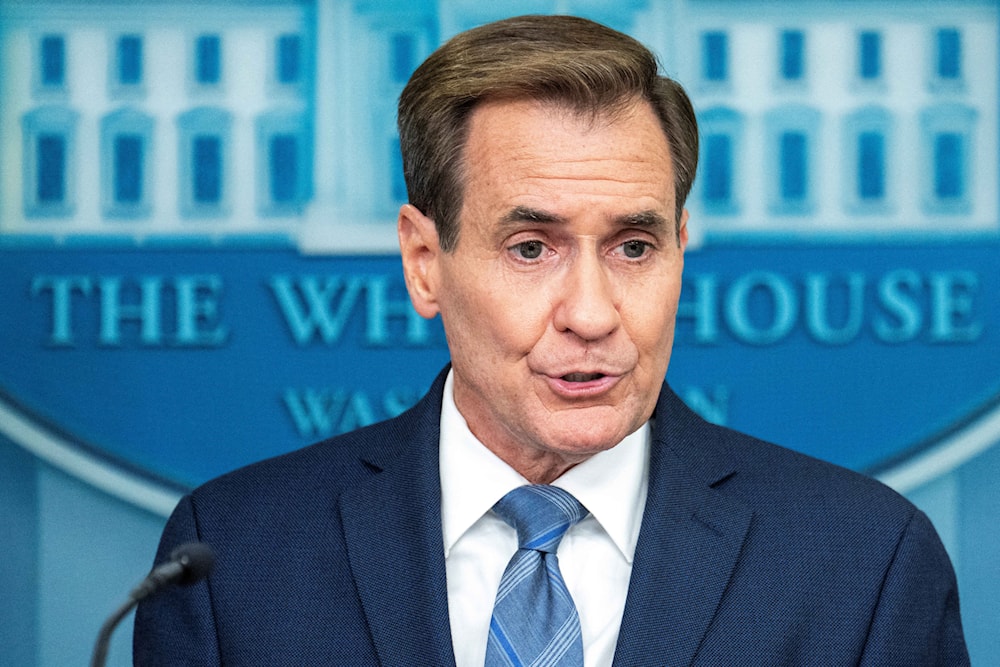Regional military escalation not in 'Israel’s' 'best interest': Kirby
Kirby notes that tensions are running high and explains that there may still be "time and space for a diplomatic solution."
-

National Security Communications Advisor John Kirby speaks during the daily briefing in the Brady Briefing Room of the White House in Washington, DC, on September 18, 2024. (AFP)
A regional military escalation is not in the Israeli occupation's "best interest", noted White House National Security spokesperson John Kirby, as rising cross-border warfare in the north raises the prospect of an all-out war.
"We don't believe that escalating this military conflict is in their best interest," Kirby told ABC's "This Week," adding that the US is "saying this directly to our Israeli counterparts."
Kirby noted that tensions are running high and explained that there may still be "time and space for a diplomatic solution," claiming the US was working toward it.
As per the Islamic Resistance's statement, Hezbollah fighters fired dozens of Fadi-1 and Fadi-2 long-range rocket artillery shells at the strategic Israeli Air Force base, located to the east of the city of Haifa.
Hezbollah publishes a video detailing the specs of Fadi-1 rocket.
— Al Mayadeen English (@MayadeenEnglish) September 22, 2024
Characteristics:
Explosive head: 83kg
Caliber: 220mm
Length: 6 meters
Range: 70km
Fadi-1 is a tactical surface-to-surface rocket used in wide-range bombardments, meaning that it is not precision-guided.
The… pic.twitter.com/coSovQQvHl
Located in the occupied Nassriyah district, in the Jezreel Valley, the base is home to several Israeli Air Force squadrons and F-16 fighter jets that are responsible for launching aggressions on Lebanese territory.
Hezbollah publishes a video detailing the specs of Fadi-2 rocket.
— Al Mayadeen English (@MayadeenEnglish) September 22, 2024
Characteristics:
Explosive head: 170kg
Caliber: 302mm
Length: 6 meters
Range: 100km
Fadi-2 is a tactical surface-to-surface rocket, used in wide-range bombardment, meaning that it is not precision-guided.
The… pic.twitter.com/OqaTW78mTp
After Israeli Prime Minister Benjamin Netanyahu earlier promised to return northern settlers to settlements evacuated due to Hezbollah strikes, Kirby noted that a broader war will "certainly not going to be in the best interest of all those people," detailing there are "better ways" to return settlers to the North.
Kirby further stressed that the US was involved in "extensive and quite assertive diplomacy" and stated, “We are not achieving any progress here in the last week to two weeks.”
The spokesperson repeated previous US claims of having no involvement in the Israeli pager attack on Lebanon last week.
The head of the local authority in the settlement of Kiryat Bialik, north of occupied Haifa, acknowledged that the fears of settlers regarding potential Hezbollah missile strikes had come to fruition. He expressed concern about the precarious situation the settlers are facing in the North, highlighting that "there are not enough shelters" to protect them from escalating threats.
"For a year, we feared that the rockets would reach us, and now that fear has become a reality," he stated, adding, "We hope we won't have to endure a year like the residents in the North, where there aren't enough shelters for everyone."
Israeli media: Hezbollah paralyzes the North
Israeli media confirmed that the attack carried out by the Islamic Resistance in Lebanon on Sunday has effectively "paralyzed the North," underscoring the significant impact of Hezbollah's actions on the region's stability.
Israeli media reported that Hezbollah launched over 120 rockets toward the North in recent hours, with approximately 30 of those fired since the morning aimed at the Krayot area, north of Haifa.
The report indicated that sirens were continuously sounding in the North and several industrial areas, reflecting the persistent alerts due to rocket attacks. Additionally, Israeli Army Radio emphasized that Hezbollah "carefully chose the targets it aimed at and the counter-message it intended to convey."

 3 Min Read
3 Min Read








